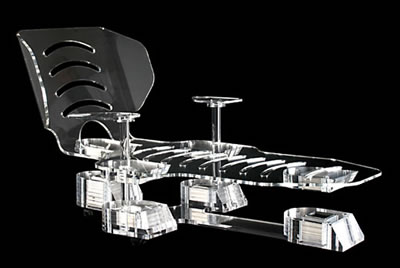Science Fiction
Dictionary
A B C D E F G H I J K L M N O P Q R S T U V W X Y Z
Hoverit Lounger Suspended Vonnegut Dream

The Hoverit Lounger is a seriously rigid acrylic chair suspended by powerful magnets. Comfortable? Maybe not, but you're hovering! That's got to count for something.

(Hoverit Lounger by Hoverit, Ltd.)
Four types of Lounger are available, each having different shaped holes in the seat part: circular, hearts, droplets or slots (watch this space for images showing the difference). Four ‘anti-scratch’ mat options are also available; circular holes, hearts, droplets or slots cut into the mat. When ordering you can choose any mat with any Lounger type.Take a look at this quick Hoverit Lounger video.
Loungers can also have graphics applied and we’ll soon have a range of accessories available including cushions and up-lighters.
The 2 meter-long chair costs a mere $8,350 dollars and is built by hand in the UK by Hoverit, Ltd.. The company describes it as the first of their magnetic hover furniture - can other office and home furnishings be far behind?
Kurt Vonnegut certainly hoped so. In his 1959 novel The Sirens of Titan, he referred to suspended furniture.
The office was spookily furnished, since none of the furniture had legs. Everything was suspended magnetically at the proper height. The tables and the desk and the bar and the couches were floating slabs...
(Read more about Vonnegut's magnetically floating furniture)
From Hoverit Ltd. via Boingboing.
Scroll down for more stories in the same category. (Story submitted 2/4/2009)
Follow this kind of news @Technovelgy.| Email | RSS | Blog It | Stumble | del.icio.us | Digg | Reddit |
Would
you like to contribute a story tip?
It's easy:
Get the URL of the story, and the related sf author, and add
it here.
Comment/Join discussion ( 1 )
Related News Stories - (" Lifestyle ")
Sleep Pods At Daxing International Airport
'Do not waste your priceless company on the unappreciative folds of a sleep pod...' - Chris Boyce, 1967.
Amazon Blimp Parent Drone Concept
'So the parent drone carries a spotter that it launches...' - Daniel Suarez, 2012.
Tortoise Mobile Smart Stores
'... all round the city dozens of cars have rented out their trunks, which contain cigars and scotch and stuff.' - Karl Schroeder, 2019.
Sony Pocket Air Conditioner Is Phil Dick's Idea!
'... he went to the hall closet to get his pith helmet and his mandatory cooling-unit.' - Philip K. Dick, 1965.
Technovelgy (that's tech-novel-gee!) is devoted to the creative science inventions and ideas of sf authors. Look for the Invention Category that interests you, the Glossary, the Invention Timeline, or see what's New.
Science Fiction
Timeline
1600-1899
1900-1939
1940's 1950's
1960's 1970's
1980's 1990's
2000's 2010's
Current News
The New Habitable Zones Include Asimov's Ribbon Worlds
'...there's a narrow belt where the climate is moderate.'
Can One Robot Do Many Tasks?
'... with the Master-operator all you have to do is push one! A remarkable achievement!'
Atlas Robot Makes Uncomfortable Movements
'Not like me. A T-1000, advanced prototype. A mimetic poly-alloy. Liquid metal.'
Boring Company Drills Asimov's Single Vehicle Tunnels
'It was riddled with holes that were the mouths of tunnels.'
Humanoid Robots Tickle The Ivories
'The massive feet working the pedals, arms and hands flashing and glinting...'
A Remarkable Coincidence
'There is a philosophical problem of some difficulty here...'
Cortex 1 - Today A Warehouse, Tomorrow A Calculator Planet
'There were cubic miles of it, and it glistened like a silvery Christmas tree...'
Perching Ambush Drones
'On the chest of drawers something was perched.'
Leader-Follower Autonomous Vehicle Technology
'Jason had been guiding the caravan of cars as usual...'
Golf Ball Test Robot Wears Them Out
"The robot solemnly hit a ball against the wall, picked it up and teed it, hit it again, over and again...'
Boring Company Vegas Loop Like Asimov Said
'There was a wall ahead... It was riddled with holes that were the mouths of tunnels.'
Rigid Metallic Clothing From Science Fiction To You
'...support the interior human structure against Jupiter’s pull.'
Is The Seattle Ultrasonics C-200 A Heinlein Vibroblade?
'It ain't a vibroblade. It's steel. Messy.'
Roborock Saros Z70 Is A Robot Vacuum With An Arm
'Anything larger than a BB shot it picked up and placed in a tray...'
A Beautiful Visualization Of Compact Food
'The German chemists have discovered how to supply the needed elements in compact, undiluted form...'
Bone-Building Drug Evenity Approved
'Compounds devised by the biochemists for the rapid building of bone...'
